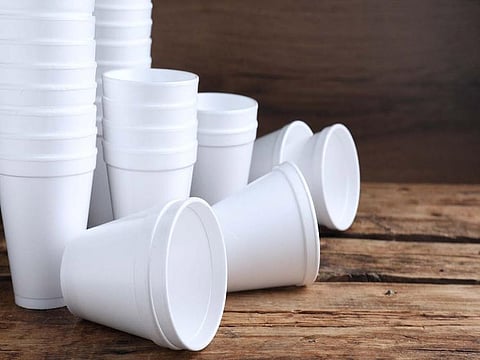Abu Dhabi inspectors to check compliance with single-use styrofoam ban
Some items such as single-use cups, plates and boxes prohibited from today, June 1

Abu Dhabi: The Environment Agency - Abu Dhabi began today, June 1, implementing the ban on single-use styrofoam products in all markets in the emirate.
The Department of Economic Development (DED) in Abu Dhabi had earlier sent a circular banning styrofoam to more than 50,000 commercial establishments and 80 industrial facilities working in the field of plastic manufacturing.
The Department is scheduled to conduct field inspection campaigns on sales outlets and industrial establishments, to ensure that the ban is implemented throughout Abu Dhabi, according to a specific timetable.
Banned items
The list of prohibited products includes disposable cups, lids and plates made of styrofoam. The list also includes food containers used to pack fast food or ready-to-use meals for immediate consumption, or containers that contain a ready-made product that is usually consumed from the container without any additional processes such as cooking or heating.
What is excluded from the ban?
The Authority excluded from the ban “expanded polystyrene” products that are not designed for single-use use. This includes large storage boxes and plates (trays) used to preserve meat, fish, vegetables, fruits, ready-made dairy products, and other food items intended for retail sale. Products for retail sale are also excluded from the ban, as well as those designed for medical uses.
Role of community members

She added: “Our long-term goal is to limit the entry of microplastics into the food chain, which can have harmful effects on human health, biodiversity, and our natural ecosystems.”
Dr Sheikha pointed out that the Authority was “very selective” in choosing Styrofoam products that are banned, and all banned products have easily accessible alternatives.
Plastic bag ban
EAD had announced a policy for single-use plastics for the Emirate of Abu Dhabi in 2020, and in 2022 it issued a ban on single-use plastic bags, in partnership with retailers.
Dr Sheikha explained that the implementation of the single-use plastic materials policy in the emirate of Abu Dhabi achieved success in avoiding the consumption of 310 million single-use plastic bags until the end of April 2024.
The percentage of reduction in the number of bags distributed to the payment boxes at retailers reached 95 per cent, and thus Abu Dhabi avoided waste. More than 2,000 tonnes of single-use plastic bags and over 67 million disposable plastic bottle were collected in 2023.
Dr Sheikha said: “All of these important results would not have been achieved without the contribution of consumers and the support and participation of the private sector.”



